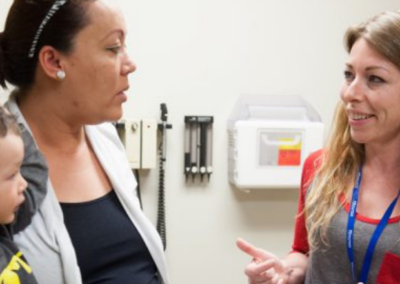Whole Person, Whole Health: Centering Mental Health in Maternal Care

By Maris Gelman, Interim Program Director, Health Leads

I’ve worked in the maternal health advocacy space since 2020, and entered the field more personally when I became a mom of twins in 2022. As we near the end of Maternal Mental Health Awareness Month, I’ve been reflecting on the critical role that mental health services and support were to my journey into parenthood and the case I’d make to better support birthing people not only where I live and work in New York, but across the U.S.
Despite progress in many areas of maternal healthcare, mental health conditions during pregnancy and the postpartum period continue to be leading contributors to maternal mortality. Pregnancy-related death in the U.S. increased by nearly 28% between 2018 and 2022, with large disparities based on geography, race, and ethnicity. Mental and behavior disorders were included among the top contributing factors to preventable maternal death.
In addition to postpartum depression, anxiety, and severe mood disorders, pregnancy-related deaths also involved factors such as discrimination, healthcare disparities, and racial bias, especially within BIPOC communities. These systemic issues not only exacerbate the physical risks faced by pregnant and postpartum people, but also hinder access to necessary mental health support. Addressing these inequities by making services more accessible and culturally competent is vital for improving health outcomes for all birthing people, particularly those from under-resourced communities.
In my work with the New York Coalition for Doula Access, a statewide coalition largely comprised of community based doulas providing services to birthing New Yorkers with the most need, I see how this advocacy group has a front row seat to these challenges. The group frequently uplifts solutions designed around community needs – starting with better integrating maternal mental health initiatives into the broader healthcare system. Improved collaboration among obstetricians, midwives, and other healthcare providers can ensure holistic care that addresses both physical and mental health needs. In response to our members expressing a need to be in community with one another to share the challenges of doing this critical work, NYCDA launched the NYCDA Healing Space.
I was also able to think critically about how to shift the landscape during my recent fellowship through the Policy Center for Maternal Mental Health. My former colleague and trained doula Jennifer Gonzalez and I developed a set of recommendations aimed at advancing maternal mental health policies across New York and other states.
- Build a Coalition of Stakeholders: In this work, we need all hands on deck, as many groups have a role to play and key input to provide on how to better support birthing people. But the maternal mental health ecosystem remains fragmented, given the strain on the sector. By backboning a coalition of doulas, patients, healthcare providers, policymakers, advocates, and community-based organizations, these stakeholders can game plan, prioritize and move together toward improving maternal mental health outcomes.
- Identify Champions from the Field: In our most successful efforts around doula sustainability, Health Leads focused on identifying legislative and organizational champions—those who could advocate for and support maternal mental health initiatives. State Senator Samra Brouk is the Chair of the Mental Health Committee and is a steadfast champion in furthering maternal mental health policies in New York. These champions are essential for driving forward policy changes and ensuring that mental health is prioritized in maternal healthcare legislation.
- Advocate for Resources: Using both formal and informal methods of advocacy, NYCDA aimed to support the passage of New York State Senate bill S2359 that improves access to care and funding mental health services for expecting and new parents. Advocacy efforts included direct action, social media campaigns, and writing letters of support to spread awareness and rally support for this critical legislation. Working to replicate bills like these in other states is a key strategy for ensuring maternal mental health gets the attention and resources it deserves.
- Launch a Maternal Mental Health Work Group: As outlined in S2359, Health Leads would support the launch of a maternal mental health workgroup. This group will serve as a platform for stakeholders to come together and work collaboratively towards implementing policies that improve maternal mental health outcomes. The workgroup will also issue recommendations to inform future laws and policies aimed at supporting maternal mental health.
- Invest in the Doula Workforce: The care and support from a doula before and after birth can have a positive impact on maternal emotional wellbeing and mental health – by reducing anxiety, unhappiness and stress, and increasing self-esteem and self-efficacy. But this workforce continues to be under-resourced and not well integrated into care teams.
Many of these efforts are taking place across the country, in different states, but without consistent investment, and often without the leadership of those closest to the problem of maternal mental health. But with an infrastructure of coordination, advocacy and communication, we have an opportunity to build a strong community of stakeholders working together to address maternal mental health. While we still have further to go, the progress made in New York can serve as a model for other states to follow, ensuring that all birthing people, regardless of their background, have access to the mental health support they need for a healthy pregnancy and postpartum experience.
Stay updated on our maternal health work, including upcoming webinars, with our newsletter!




